Anti-aging treatments; At A Glance
- Best ResultsFor life
- Treatment Recovery0-1 day
- Procedure Time5 to 90 min
- Skin SpecialistDermal therapist, nurse
- Duration of ResultsVariable
- AnaestheticNA
- Back to Work0-1 days
- Cost $-$$
Anti-aging; prevention
Ideally prevention strategies for anti-aging include skin care at home, supplemented with clinically proven office procedures such as chemical peels, laser resurfacing & injectables. The use of antioxidants, niacinamide, ascorbic acid & retinol can slow down the aging process. Photoprotection, stress relief & diet play an important role in slowing down intrinsic & extrinsic ageing.
FactsFacts on Anti-aging
- Starting an effective anti-aging program can slow down the aging process
- The very first step is habitual use of sunscreen
- Antioxidants protect your skin from toxins & DNA damage
- Retinoids build collagen & thicken the dermis & epidermis
- Niacinamide enhances skin barrier function & reduces inflammation
- Ascorbic acid protects against free radical damage to DNA
- Oral supplementation with resveratrol & Nicotinamide Mononucleotide can reduce stress to cells
- Chemical peels, lasers & skin tightening procedures can effectively build collagen & should be incorporated into anti-aging skin care
What is the best anti-aging skin care routine?
Start off with sun protection. It is a lot harder than it seems to get it right. Use a SPF 50+ twice a day.
The next step are antioxidants. They form the second layer of defence against UV & environmental stressors (see below).
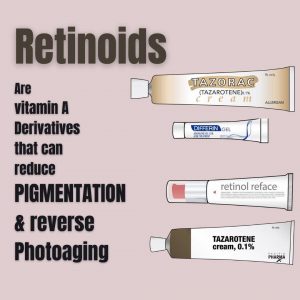
Vitamins are essential for skin health. A good starting point is retinol, followed by niacinamide and ascorbic acid. AHA’s including glycolic & lactic acid can be used once a week to exfoliate dead skin cells & increase absorption of other actives.
Clinical peels including high strength AHAs & retinoic acid can be performed once a month.
What are antioxidants?
Antioxidants are the second layer of defence after sunscreens. These molecules protect your collagen & DNA from free radical damage due to UV radiation & environmental pollutants. Antioxidants can be found in your diet, taken as a supplement (eg Resveratrol), or applied topically on your skin. Ideally applied in the AM, under your sunscreen. Look for the following ingredients-
Vitamin C or ascorbic acid is one of the most powerful antioxidants. This is why most dermatologists will advocate its use in the AM, under SPF.

Formulation range 10-20%, go on the lower end if you have sensitive skin. The activity depends on the formulation pH. You should aim for a pH range of 2.5 to 3.5 for maximal penetration into the deeper epidermis.
Vitamin E or alpha tocopherol is a fat-soluble vitamin & often incorporated with ferulic acid & ascorbic acid. It has a low irritation potential.
Vitamin B can also have antioxidant effects, however not as powerful as vitamin C, E or ferulic. Good choice for sensitive skin.
Ferulic Acid is a naturally occurring antioxidant found in cereals like oats. It stabilizes vitamin C & E, and hence has synergistic effects with these skin vitamins. The best formulations will have CE & Ferulic mixed in.
CoEnzyme Q 10 is a benign, cost effective antioxidant. Can be found in food and or topical formulations.
Resveratrol is one of the most powerful antioxidants taken orally. It is found in plants including grapes & nuts.
Green tea, isoflavones, soy, ginseng, & botanical berries: all excellent naturally occurring antioxidants found in organic skin care products.
Why start with retinol?
Understanding what your skin can tolerate is the first step in good skin care. Prescription retinoids such as tretinoin, retinoic acid, adapalene & tazarotene will cause skin irritation. A sensible approach is to start off with over-the-counter retinoids including retinol, retinyl esters, & retinaldehyde. These compounds require conversion to pharmacologically active retinoic acid. These conversion steps slow down the process to yield bioavailable retinoic acid, in turn markedly reducing side effects.

Start off with a good formulation of retinol, 0.5% every second night, then slowly increase as tolerated. You can step up to 1.0% after a few months.
Why are retinoids the number one topical for anti-aging?
Retinoids have many anti-aging effects, including-
- Stimulation of collagen, elastin & hyaluronic acid. This accounts for the anti wrinkle & plumping effects of retinoids.
- Reduction of pigmentation as retinoids suppress tyrosinase. This can improve melasma, dull skin & age-sun spots.
- Retinoids compacts the stratum corneum, accelerates cell turnover & thickens the epidermis & dermis. This results in better light transmission, more luminous skin & less wrinkles.
- Retinoids increase blood vessels, a term called angiogenesis. This results in glowing dewy skin.
When is a good time to start treatment?
The best time to start ‘B Injections is controversial. It really depends on how dynamic or expressive you are. In truth the age ranges from early 20s to late 30s. Some people just don’t wrinkle – that’s a fact.
Expression also changes with your lifestyle, job, & relationships. You may go through many years without frowning, or added stress, only to find yourself in a shitty job, relationship or time of your life. As a guide, small units of treatment starting in your mid to late 20s can reduce static wrinkles.
When is a good time to start hydrating treatments?
Hydration treatments can be used in two ways. Firstly, to correct & enhance genetically deficient areas. Examples include recessed chin, maxillary hypoplasia, jawline deficiencies, & bumps on the nose. In this context, hydrating treatments can be initiated in early adult life as part of a non-surgical approach to correct.
Hydration treatments can also be used to replace volume loss. As we age, we lose 1% of collagen for every year of life starting in the 20s. Hence, in this context hydrating treatments can be useful in your late 20s to early 30s. The amount of volume depends on your genetic makeup as well as your metabolism.
A sensible way to approach hydrating treatments is to start off with one syringe at a time. One syringe contains one ml of hyaluronic acid hydration treatment, the same volume as ⅕ of a teaspoon. Not much once you put things into perspective.
Can collagen supplements be useful?
At the time of writing, there are no great studies to suggest that collagen supplements are useful in the context of skin rejuvenation. There are however many studies that support glycosaminoglycans for joint health.
My thoughts? Given the joint benefits of collagen supplements, the safety profile & costs, this supplement does no harm.
What are other scientifically proven anti-aging supplements?
Metformin has been used by anti-aging doctors for nearly a decade. This modulates glucose, insulin, AMPK & IGF levels, reducing inflammation & oxidative stress. Dermatologists prescribe metformin for conditions like PCOS, hidradenitis suppurativa, & acanthosis nigricans. A typical dose ranges between 500 mg to 1000 mg daily.
NMN or Nicotinamide Mononucleotide supplementation helps promote DNA repair, via the sirtuin pathway. This molecule has been shown to improve the body’s longevity and anti-aging genes.
Resveratrol is well known in the skin care industry for its antioxidant properties. This polyphenol can be found in plants, including grapes & nuts. Supplementation can reduce oxidative stress to DNA. Studies have shown that it can potentially prolong life.
Bioequivalent hormones are controversial in Australia, but well accepted in more medically advanced countries such as the United States & Europe. Our FDA lags 5-10 years behind the TGA & CE. These hormones include human growth hormone, testosterone & estrogen.
Disclaimer: I am a procedural dermatologist; my work focuses on surgical, injectable, lasers & deep peels. I do not prescribe skin care. For topical anti-aging, please consult my clinical team. For systemic agents, consult an anti-aging physician.

View our Treatment Gallery
What procedures can stimulate collagen production?
There are many clinically proven methods to stimulate collagen production with infinite combination. The ideal procedure depends on your skin type, dermal thickness, ethnicity, background sun damage, downtime, expectations & budget. As a guide-
Low Level collagen stimulation: AHA & retinoic acid peels, Tixel, pico & nano dermal toning, Laser Genesis, Low Level Laser Emission Devices.

Medium Level collagen stimulation: PDO threads, RF devices (Thermage/Venus/ Tempsure/Pelleve), HIFU including Ultherapy, hyaluronic acid hydrating treatments, fractional laser resurfacing including CO2, high density Thulium 1927, 1440 -1550 nm lasers, erbium fractional, hybrid lasers.
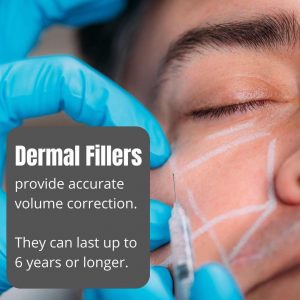
High Level collagen stimulation: Hydration treatments – Polymer Injectable, calcium hydroxyapatite. CO2 & erbium fully ablative laser resurfacing. Semi-invasive RF devices.
What procedures can prevent sagging & skin laxity?
I use a variety of prophylactic skin laxity treatments. The ideal treatment depends on degree of laxity, dermal thickness, background sun damage, expectations & ethnicity.
For prevention one can use RF devices such as Tempsure or Pelleve. I also use HIFU – Ultherapy in a modified delivery to help tighten. In some cases, I combine skin heating devices with threads or hydrating treatments.
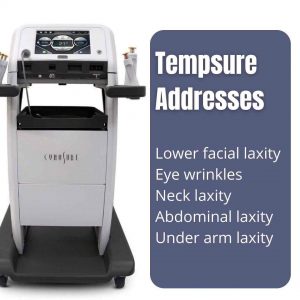

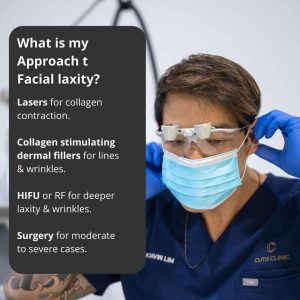

What types of chemical peels are useful for anti-aging?
The go to collagen stimulating peels are AHA, Jessner & retinoic acid peels. These peels can be incorporated into your current skin care routine to boost collagen, reduce congestion & improve your skin’s light reflectance.


AHA peels include glycolic, mandelic, & lactic acid. Clinical peels are low pH, minimally buffered peels, starting at 20%, ending at 70%. AHA peels are known for their brightening effects & are excellent for anti-aging.
Retinoic acid peels range between 1 to 5%. This peel can be a superficial peel, or it can be delivered to the basal layer & beyond, making this a medium depth peel (extending into the papillary dermis). I really like retinoic acid peels as they are about 200 to 500 times the strength of over the counter retinol. Most patients peel for 3 to 7 days or more, hence you must time this peel correctly to avoid impromptu downtime.
Jessner peels are a combination of lactic, & salicylic acids with resorcinol. This is an excellent anti-aging peel that can be used as a standalone, or as a pre-peel combined with TCA.

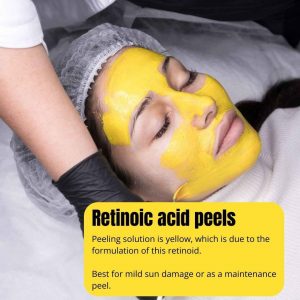
What is microTox & how is this delivered?
MicroTox or micro delivery of treatment is a nice steppingstone to injectables. This procedure sprinkles small doses of BTX to key areas of the face including the forehead & eye area. The units delivered are very small in comparison to actual injections. This works by subtly reducing muscle activity in the superficial dermis, surrounding the hair follicles/pores & blood vessels. The result? Smaller pores, less redness, less wrinkles & better skin texture.
I use 3 ways to deliver Tox & hydrating treatments in the context of preventive medicine. Firstly, with Aquagold delivery, secondly using Tixel enhanced delivery, & lastly with micro-injections.
What is a simple anti-aging program?
This is a simple starting point that is convenient, affordable and effective. There are many variations, depending on your age, clinical condition, ethnicity & targets.
AM: Antioxidant (vitamin C, E), sunscreen.
PM: Retinol +/- niacinamide – ascorbic acid.
Weekly: Exfoliation AHA (as tolerated)
Monthly: Retinoic acid peel or clinical AHA peel.
Yearly: Low level fractional laser, or low level HIFU/ RF

Disclaimer: I do not consult for anti-aging programs, my work is focused on complex procedural dermatology. For an anti-aging solution, please consult my clinical team.
What is a good DIY or home anti-aging routine?
Let’s cut the crap & focus on science. I won’t discuss lemon juice, herbs, & Russian roulette acid peels. A good DIY-home routine has the foundation of great skin care, namely sun protection, anti-oxidants, vitamins, & acid exfoliators. From there you can add-
- Microneedling at 0.1 to 0.2 mm. A dermaroller, provided it is performed correctly will suffice. Don’t fall for the crap about pens vs rollers, in the context of short needles this does not matter. Obviously do not exceed 0.25 mm, you have been warned. Rollers start at 3-5 dollars from eBay or Amazon. Single use only. Microneedle once every 3 weeks. This can stimulate collagen & increase the potential of your skin care ‘actives’. A home treatment is not as effective as an in office professional session.
- AHA +/- BHA buffered 20-25% exfoliation. Intermittent (every 2-4 weeks) exfoliation can improve dull skin, but importantly potentiate the action of other molecules including ascorbic acid & retinol / retinoids. Do not try this if you do not thoroughly understand your skin’s threshold.
- Sheet masks may be just wipes with holes cut out of them, however they can be useful as ‘super-hydrators’ or wet wraps. They work by increasing the potency of other topicals. A DIY hack is to apply your ingredient of choice, then apply a hyaluronic acid face mask for 30 minutes then reapply your active. Epidermal hydration potentiates the penetration of actives, in particular hydrophilic particles such as vitamin C.
- Microcurrent devices are relatively new (been in the market for about 5 years). They have a good patient satisfaction rate with a dearth of great reviews, however the objective clinical findings are lacking. Regardless, they can be relatively cost effective DIY home supplementation to skin tightening.
What is LED phototherapy & does it work?
LED or light emitting diodes can be useful in the management of acne as it can inhibit bacterial growth. LED can also help with wound repair & hence its use post laser resurfacing.

I do not believe that LEDs have any perceivable effects when it comes to anti-aging. Namely the use of in clinic & hand held devices will not increase collagen, nor will they provide any anti-aging benefits; unless combined with a photoactive chemical like amino-levulinic acid. There are far better ways to stimulate collagen including pico, nano & laser genesis devices.

What lifestyle choices can reduce chronological aging?
I guess you know the answer to this question. The most common cause of aging is sun exposure, & smoking, followed by stress & eating crappy food.
UV, in particular UVA penetrates into the deep dermal layer, breaking up collagen, elastin & hyaluronic acid. This is called elastosis & is commonly seen in Queenslanders brought up in the 70s & 80s. The simple use of sunscreen will markedly reduce photoaging.
Other lifestyle choices to consider include smoking, stress & diet. Eating nutritionally rich foods high in antioxidants can reduce free radicals that damage DNA. Sleep more than 7 hours, exercise 3 times a week & stay happy. You will age slower.
Why do some ethnicities age less than others?
There is a complex interplay between genetics, & epigenetics. It is well known that certain ethnicities such as Asian’s, age less compared to age matched Caucasian counterparts. Part of the reason is that Asians have thicker collagen bundles & their immune system is more hyperactive when it comes to collagen stimulation (overactive fibroblasts). It’s not all good, as over reactive fibroblasts can produce too much abnormal collagen, aka keloid scars.
Genetics play a huge role in ageing. Unfortunately, one cannot modify your DNA, however with scientifically proven strategies you can slow down aging.
What about stem cells & antiaging?
There is some evidence that injected autologous stem cells improve skin quality. These stems are derived from adipose tissue, namely fat transfer post liposuction. Fat transfer is a treatment for volume loss due to atrophy, however ASC or adipose stem cells can, in theory differentiate to other cell types.

I like fat transfer for the correction of large volume atrophy however in the context of epidermal & dermal remodelling there are other procedures that can give a more predictable anti-ageing benefit, for example hydrating treatments, collagen stimulating hydrating treatments, & skin directed therapy such as lasers, peels & basic simple skin care.
I do believe that stem cell skin therapy will improve however at the time of writing, we do not have predictable & reproducible protocols for anti-ageing. In the context of skin care & oral stem cell supplementation, there are more robust studies with mainstream ingredients such as retinoids & antioxidants.
Who should you see for an anti-aging plan?
Book an obligation free consultation with my clinical team. They will provide you with an accurate assessment of your skin’s health & implement an effective treatment plan including skin care & recommended procedures.
*Please note, I do not provide any skincare advice. My job focuses on surgical, complex laser & injectable procedures.
How much are treatments?
Anti-aging procedures are super affordable.
- Chemical peels including AHA, Salicylic acid & retinoic acid peels $98
- Level 1 laser resurfacing: from $450
- Tixel from $350
- Skin Tightening from $450
Book an appointment with my clinical team for an assessment & guide.
Davin’s Viewpoint on Prevention of Aging
You know who is eventually going to win. Anti-aging is such a misnomer, you can’t ‘anti’ the course of nature, nor can you prevent it. What you can do is to slow it down.
Start off with the basics, namely protect, preserve, build & correct. Antioxidants include ferulic, ascorbic, acids, tocopherol, resveratrol, & green tea. Add retinoids, B3 and vitamin C, exfoliate once every 2 weeks.
Supplement your anti aging skin care routine with in office treatments including chemical peels, lasers & injectables.
The implementation of injectables including neurotoxin & HA hydrating treatments can be controversial. If there are attributes on examination that can be corrected (eg redness, enlarged pores, fine lines, wrinkles, recession), injectables can, if so elected, be commenced in the early 20s. Micro doses can be delivered with devices like the V2 Injector, Aquagold, Tixel & thulium lasers.
Bioequivalent hormones & supplementation with resveratrol, NMN & metformin is considered mainstream antiaging in the United States & throughout Europe. Provided it is managed by a physician, these systemic anti-aging hormones & supplements are safe. The mainstream medical fraternity in Australia may not know about these methods.
